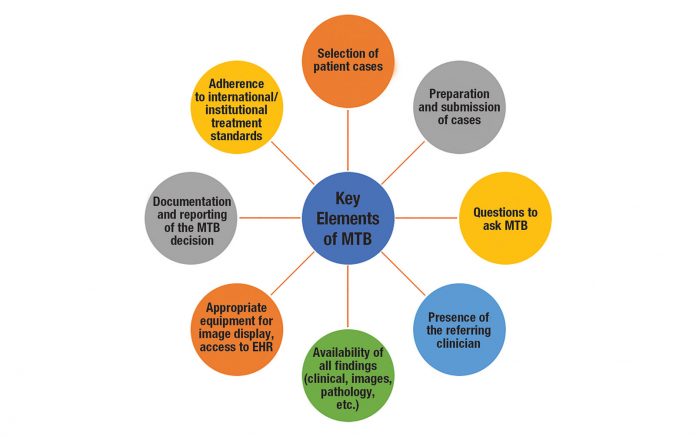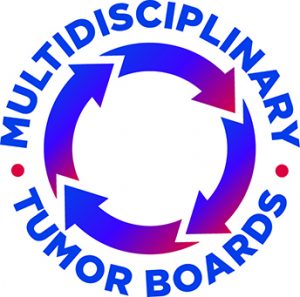By Ross Soo, MB, BS, PhD, FRACP
Posted: August 19, 2020

Impressive progress has been achieved in many aspects of lung cancer. Over the past decade, advances have occurred in multiple areas including diagnostic radiology, interventional pulmonology and radiology, molecular pathology, radiation therapy, minimally invasive surgery, immunotherapy and molecular-targeted therapy. Unsurprisingly, patient care has become increasingly complex, multifaceted, and highly specialized. The development of a lung multidisciplinary tumor board (MTB) can aid clinicians in making better decisions for their patients.
Our institution has been holding a lung MTB for more than 15 years, initially under the direction of the National University Hospital and subsequently under the National University Cancer Institute, Singapore. The lung MTB is held weekly, every Monday at lunchtime for up to 1 hour, in a dedicated classroom-style meeting room. The meeting room includes an electronic health record system connected to projection equipment. Core lung MTB team members include a radiologist specializing in thoracic imaging, an interventional radiologist, a nuclear medicine physician, a thoracic pathologist, respiratory medicine physicians, a thoracic surgeon, radiation oncologists, and medical oncologists (Table), as well as a dedicated administrator. Other attendees include consultants, trainees, and fellows from medicine, surgery, radiation oncology, and medical oncology as well as medical students. The attendance each meeting ranges from 18 to 31 people, with an average of 24 attendees. For each meeting, attendance is recorded and is used to claim continuing medical education credit.
The lung MTB is conducted with several objectives in mind:
- First, to provide optimal management through recommendations supported by sound evidence and a consensus-based approach;
- Second, to provide clinician education by sharing expertise from each discipline in an open environment, thereby promoting a wider knowledgebase for future care;
- Third, to increase awareness of research and participation in clinical trials; and
- Fourth, to promote appropriate and timely referrals between disciplines.
For the lung MTB to operate efficiently, several factors need to be considered and are summarized in the Figure.
The lung MTB predominantly discusses patients diagnosed with thoracic malignancies; however, not all patients with newly diagnosed lung cancer are presented. The focus is on newly diagnosed patients who require multidisciplinary input and ongoing cases with complex management issues. Other subspecialties may present cases for which a radiologic review of a thoracic lesion is required, or for which an opinion is sought on local therapeutic management such as surgical resection, radiologic-guided ablative therapy, or stereotactic body radiation therapy of a pulmonary lesion. The lung MTB, however, is not structured to function as a molecular tumor board. Cases with complex genetic information are presented and discussed at a separate, dedicated molecular tumor board.
Our lung MTB workflow is as follows: A healthcare professional submits cases using a template form to the administrator, who collates and lists all the cases on a password-protected spreadsheet for all members of the lung MTB prior to the meeting. The cases are initially presented by the patient’s primary physician or fellow, when relevant; radiologic and pathologic findings are reviewed; management is discussed; and the plan is subsequently documented on the template form and signed by the submitting physician. The form is then scanned and uploaded into the electronic health record system.
Tumor board meetings with video or web conferencing have been conducted for many years elsewhere. Recently, we have adopted an internet-based platform for lung MTB meetings. At the time of writing, in response to the ongoing COVID-19 outbreak in Singapore, face-to-face meetings and group meetings have ceased. As such, our lung MTB has been conducted on a commercial web-based platform using a secure line where all can join in simultaneously.
The lung MTB, however, is not structured to function as a molecular tumor board. Cases with complex genetic information are presented and discussed at a separate, dedicated molecular tumor board.
In summary, a multidisciplinary lung tumor board is a key component at our institution in Singapore in the management of patients with lung cancer. In addition, it also provides a venue for clinician education and the discussion of clinical trials. ✦
About the Author: Dr. Soo is a senior consultant, Department of Haematology-Oncology, National University Cancer Institute, Singapore. He is a member of the IASLC Communications Committee.
Related Article:
Multidisciplinary Tumor Boards: Approaches Across Different Institutions













